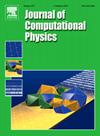A front-tracking immersed-boundary framework for simulating Lagrangian melting problems
IF 3.8
2区 物理与天体物理
Q2 COMPUTER SCIENCE, INTERDISCIPLINARY APPLICATIONS
引用次数: 0
Abstract
In so-called Lagrangian melting problems, a solid immersed in a fluid medium is free to rotate and translate in tandem with its phase-change from solid to liquid. Such configurations may be classified as a fluid-solid interaction (FSI) problem coupled to phase-change. Our present work proposes a numerical method capable of simulating these Lagrangian melting problems and adopts a front-tracking immersed-boundary (IB) method. We use the moving least squares IB framework, a well-established method for simulating a diverse range of FSI problems [1], [2] and extend this framework to accommodate melting by additionally imposing the Stefan condition at the interface. In the spirit of canonical front-tracking methods, the immersed solid is represented by a discrete triangulated mesh which is separate from the Eulerian mesh in which the governing flow equations are solved. A known requirement for these methods is the need for comparable Eulerian and Lagrangian grid spacings to stabilise interpolation and spreading operations between the two grids. For a melting object, this requirement is inevitably violated unless interventional remeshing is introduced. Our work therefore presents a novel dynamic remeshing procedure to overcome this. The remeshing is based on a gradual coarsening of the triangulated Lagrangian mesh and amounts to a negligible computational burden per timestep owing to the incremental and local nature of its operations, making it a scalable approach. Moreover, the coarsening is coupled to a volume-conserving smoothing procedure detailed by Kuprat et al. [3], ensuring a zero net volume change in the remeshing step to machine precision. This added feature makes our present method highly specialised to the study of melting problems, where precise measurements of the melting solid's volume is often the primary predictive quantity of interest.

求助全文
约1分钟内获得全文
求助全文
来源期刊

Journal of Computational Physics
物理-计算机:跨学科应用
CiteScore
7.60
自引率
14.60%
发文量
763
审稿时长
5.8 months
期刊介绍:
Journal of Computational Physics thoroughly treats the computational aspects of physical problems, presenting techniques for the numerical solution of mathematical equations arising in all areas of physics. The journal seeks to emphasize methods that cross disciplinary boundaries.
The Journal of Computational Physics also publishes short notes of 4 pages or less (including figures, tables, and references but excluding title pages). Letters to the Editor commenting on articles already published in this Journal will also be considered. Neither notes nor letters should have an abstract.
 求助内容:
求助内容: 应助结果提醒方式:
应助结果提醒方式:


